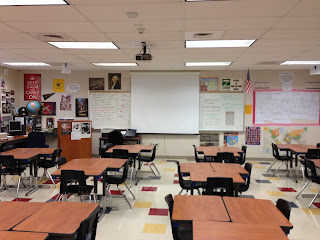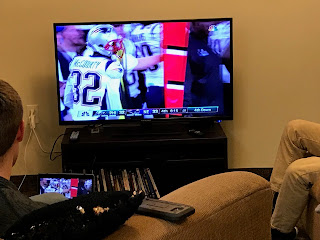Imagined Classroom
1. Classroom images
This image shows the desks arranged in groups. I want the focus of the student to be on each other and not me. By putting the desks in groups, the students will have to look at each other and it help in group work and discussions (image from here).
 This image shows the teacher's desk at the back of the room. I want to arrange my classroom in such a way that I am not front and center. I want to be there to help facilitate discussion but I won't be up at the front lecturing all day. The "front" will be like the whiteboard/projector so when we do work as a class, they are focusing on what is going on, not me (image from here).
This image shows the teacher's desk at the back of the room. I want to arrange my classroom in such a way that I am not front and center. I want to be there to help facilitate discussion but I won't be up at the front lecturing all day. The "front" will be like the whiteboard/projector so when we do work as a class, they are focusing on what is going on, not me (image from here).
This image shows a bookcase with lots of different kinds of books. This is the bookcase I imagine in my classroom. Because I will teach English, I want to make sure that everything focuses on the enrichment of the students. There shouldn't be much time for them to goof off--if they don't have an assignment to do, they can read (image from here).
This image shows an "in" and "out" basket organized by class. This is how I image my classroom will be--organized. I want the focus to be on what we do in class; there shouldn't be any confusion for the students as to what we're doing or what they need to do (image from here).

This image shows students working on computers. I imagine my classroom using technology not as just another tool but to teach technological literacy. The future is online and I feel that as an English teacher, it is part of my responsibility to teach technical genres and how to use tech to effectively get their point across. The computers will be more than just expensive word processors, they will be educational tools and genres (image from here).
2. Imagine the surrounding in your classroom. What does the room look like? What resources are available for students? How are the resources used during the lesson?
- The classroom will be arranged in groups with me at the back of the classroom. There will be a lot of books and the students will have writers' notebooks which they will use to do writing exercises at the beginning and to do practices during the lesson. They will have netbooks to use to type as well as to learn and use other types of writing genres (website building, etc.). The classroom is organized and there is plenty of paper and pencils for the students. The walls will have posters about authors and English but things that are not the normal motivational slogans. I specifically want this poster: "Unfortunately, History Has Set The Record A Little Too Straight." Bare walls are boring and I think more distracting. I want decor that is stimulating but important.
3. Describe the students in your classroom. What are their backgrounds? What are their interests? What are they doing during the lesson?
- I kind of imagine that I will teach at the high school I attended. If that's the case, I image that my students are pretty evenly split white and Latinx. I imagine that there will be wide ranges of interests--lots of athletes, art kids, a large agricultural group, band, musical theatre, STEM, etc. Their financial backgrounds vary widely as well. There is only one high school in the district so there are students from really affluent families and others that are in poverty.
4. Describe your classroom policies. What are your classroom rules? What is your discipline plan? What are your homework policies?
- My classroom policies are to respect other's points of view and comments, take risks and have fun. I will work with the students to come up with the rules of the classroom; I feel that if they come up with them, they will follow them, provided of course that if need be, as a teacher, I have the power to veto rules. My discipline plan is to address issues when they are small, talking one-on-one with the student. We work together to figure out the root issue of the misbehavior and address that instead of punishing for the behavior. Homework will be minimal, usually finishing things that are not finished in class. There may be assignments here and there based on observations, etc. but I won't assign much that cannot be done without the resources we have in class. Many of my students come from lower-income homes and many don't have internet access; I don't want to penalize students who cannot do homework because of economic situations.
5. Describe a typical lesson you will teach in your classroom. What will you teach? What is the topic? Why did you choose this topic? How will you teach it? What is the main thing you want students to learn during this lesson?
- A typical lesson will begin with reading something as a class--picture book, web article, etc. We will then have a writer's notebook about something related to that (like their opinion on an issue or coming up with a story similar to what we read). After a few students share their writing, we will jump into the material. It will be instruction built off of our larger portfolio--the lesson will be instruction, discussion and practice about a very specific facet or issue of the larger assignment, like how to identify and write for the audience of this paper by trying to sell it to a friend, teacher and grandmother, seeing how it changes each time. My teaching will be mostly pre-prep and then facilitating discussion. I will do small bursts of instruction but mostly it will be guided practice. The main thing they will be learning is the strategies of writing, that what we do will help with the larger assignment but also can be applied to writing situations outside the classroom.
6. Imagine your work as a teacher during this lesson. What are you doing during the lesson?
- At the beginning, I will introduce the concept through a though exercise. I will then ask questions to promote discussion. Next, I'll model the practice then give instruction on the individual and group practice. While they are working, I will be there observing to make sure they're on task, offering help and asking about what they think. I'll be more of a resource and guide than a lecturer.
7. Imagine your students again, what are they doing during the lesson?
- During the lesson, they are discussing--answering my questions but also asking and answering each others. During the group work, they provide their own work to be discussed but each of them are giving insights that are founded on their specific backgrounds and interests. This gives a well-rounded discussion not dominated by my point of view.
8. Imagine how you will assess your students' learning and achievement. How will you know they have learned?
- I will review the practices they do in their writers' notebooks to see how they applied the ideas and straggles we reviewed in class. I will also do exit slips occasionally as a quick feedback to gauge for the day. I'll provide feedback on their final assignments to review their understanding of the strategies but allow them to revise based on my feedback and resubmit the assignments.



Comments
Post a Comment